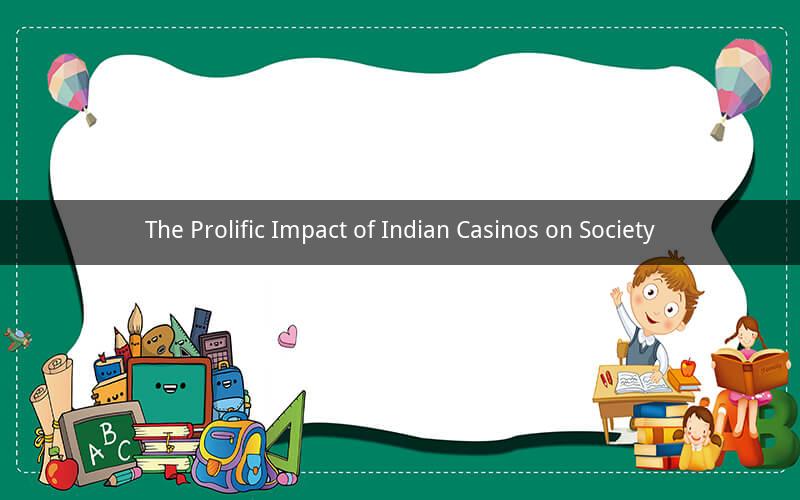
The creation of Indian casinos has had a profound impact on society, from economic growth to cultural preservation. These casinos, which are operated by Native American tribes, have become a significant source of revenue and have transformed the landscape of gaming in the United States. This article explores the various impacts of Indian casinos on society, including economic, social, and cultural aspects.
Economic Impact
One of the most significant impacts of Indian casinos is their contribution to economic growth. Indian casinos generate substantial revenue, which often leads to job creation and increased tax revenue for local and state governments. According to the National Indian Gaming Commission, Indian casinos employed over 300,000 people in 2020, making them a vital source of employment.
Moreover, the construction and operation of casinos require a wide range of services, from construction workers to hospitality staff. This, in turn, creates a ripple effect that benefits other local businesses, such as restaurants, hotels, and retail stores. In some cases, Indian casinos have even become the cornerstone of economic development in their respective communities.
Social Impact
The social impact of Indian casinos is equally significant. Casinos often provide opportunities for individuals who may have limited job prospects, offering them a chance to gain employment and improve their quality of life. Additionally, the revenue generated by casinos can be used to fund social services and programs, such as healthcare, education, and housing.
However, the social impact of Indian casinos is not without controversy. Critics argue that casinos can lead to increased crime rates, addiction, and other social problems. While some tribes have implemented measures to address these concerns, the debate over the social impact of Indian casinos continues to this day.
Cultural Impact
Indian casinos also play a crucial role in preserving and promoting Native American culture. Many tribes use casino revenue to fund cultural programs, such as language classes, art workshops, and cultural festivals. By generating significant revenue, casinos allow tribes to maintain their cultural heritage and pass it on to future generations.
Furthermore, the presence of casinos has helped to bolster the political and economic power of Native American tribes. As sovereign nations, tribes have the authority to operate casinos and regulate gaming within their jurisdictions. This has enabled them to gain a greater voice in the political and economic discourse, both locally and nationally.
Environmental Impact
The environmental impact of Indian casinos is another critical aspect to consider. While casinos are typically constructed on tribal lands, the development process can have negative consequences for the surrounding environment. Issues such as deforestation, pollution, and habitat destruction have been associated with casino construction and operation.
However, many tribes have taken steps to mitigate these negative impacts. Some have implemented sustainable practices, such as using renewable energy sources and minimizing water usage. Others have worked to preserve natural habitats and protect wildlife.
Questions and Answers
1. How have Indian casinos affected the economy of Native American tribes?
Indian casinos have significantly impacted the economy of Native American tribes by providing a substantial source of revenue. This revenue has enabled tribes to invest in infrastructure, social services, and cultural programs, leading to improved living standards and economic stability.
2. What are some of the social challenges associated with Indian casinos?
Some of the social challenges associated with Indian casinos include increased crime rates, addiction, and other issues related to gambling. While some tribes have implemented measures to address these concerns, the debate over the social impact of casinos continues.
3. How do Indian casinos contribute to the preservation of Native American culture?
Indian casinos contribute to the preservation of Native American culture by providing revenue for cultural programs, such as language classes, art workshops, and festivals. This allows tribes to maintain their cultural heritage and pass it on to future generations.
4. What is the role of tribes in the regulation of Indian casinos?
As sovereign nations, tribes have the authority to regulate gaming within their jurisdictions. This allows them to enforce gaming laws, ensure compliance with regulations, and address any concerns related to the operation of casinos.
5. How have Indian casinos impacted the environment?
The environmental impact of Indian casinos can be negative, including deforestation, pollution, and habitat destruction. However, many tribes have taken steps to mitigate these impacts, such as implementing sustainable practices and preserving natural habitats.
In conclusion, the creation of Indian casinos has had a multifaceted impact on society. While they have contributed to economic growth, job creation, and cultural preservation, they have also raised concerns about social and environmental issues. Understanding the complex nature of these impacts is essential for policymakers, tribes, and the general public alike.